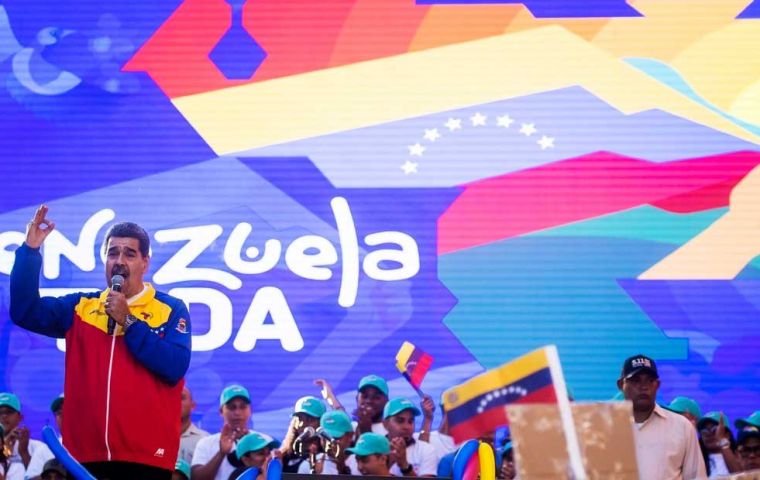
CARACAS, Dec 3 (NNN-MERCOPRESS) — Venezuela will press on with a weekend referendum over the fate of a vast disputed area in the Esequibo region it claims, disputing neighboring Guyana’s jurisdiction, despite the UN International Court of Justice, ICJ, Friday ruling urging restraint in the dispute.
In The Hague, the International Court of Justice ordered Venezuela to “refrain from taking any action which would modify the situation that currently prevails” in the Essequibo region, which Guyana has administered for over 100 years.
The judges decided in an urgent bid by Guyana to stop Sunday’s vote, but did not mention the referendum in their ruling.
Venezuela claimed victory, with Pres Nicolas Maduro saying in Caracas that Guyana and ExxonMobil, which recently found oil offshore in Essequibo, had been dealt “a historic beating.”
“On Sunday we will have a referendum,” he added, waving the court ruling in front of thousands of people at the close of the campaign urging Venezuelans to vote “yes” to all five questions posed in the referendum.
But in Georgetown Guyana’s President Irfaan Ali also welcomed the ruling, which he interpreted as meaning that “Venezuela is prohibited from annexing or trespassing upon Guyanese territory.”
He said in a statement Guyana was committed to pursuing a peaceful, legal resolution to the dispute, adding he was confident that in its final judgment in the matter, the ICJ “will conclude that the Essequibo is legally and rightfully Guyanese territory.”
Venezuela has for decades laid claim to Essequibo, which makes up more than two-thirds of the territory of Guyana and is home to 125,000 of its 800,000 citizens. Litigation is pending before the ICJ over where the borders should lie.
Guyana, a former British and Dutch colony, insists the borders were determined by an arbitration panel in 1899. But Venezuela claims the Essequibo River to the region’s east forms a natural frontier and had historically been recognized as such.
The dispute has intensified since ExxonMobil discovered oil in offshore Essequibo in 2015. Tiny Guyana currently has the world’s biggest reserves of crude per capita,
Sunday’s referendum will ask citizens whether or not Venezuela should reject the 1899 arbitration decision as well as the ICJ’s jurisdiction in the matter.
They will also be asked whether or not Venezuelan citizenship should be granted to the people — currently Guyanese — of a new “Guyana Esequiba State.”
Guyana has argued the referendum poses an “existential” threat to the country as it could pave the way for Venezuela to “unilaterally and illegally” seize the region.
The ICJ said in its ruling there was a “serious risk of Venezuela acquiring and exercising control and administration of the territory in dispute in the present case.”
The Caribbean Community (Caricom) said in a statement on Friday the ICJ order prohibited Venezuela from taking any measure “that would change the status quo in the territory, regardless of the outcome of the Venezuelan referendum on Sunday.”
It added: “Venezuela cannot by a referendum, or otherwise, violate international law and disregard the Order of the world’s highest Court.”
Brazil’s top diplomat for Latin American affairs, Gisela Maria Figueiredo, said on Thursday President Lula da Silva’s administration was following the situation with “concern.”
In the United States, which has close relations with Guyana, National Security Council spokesman John Kirby appealed for a peaceful resolution to the dispute. — NNN-MERCOPRESS






